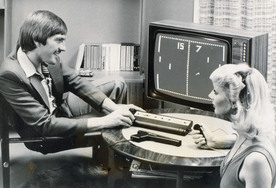
In 1972 Pong was released upon the world. To many this simple, yet addictive game represents the primordial ooze that all succeeding computer games stem from. But while Pong may have brought this new form of media to the attention of the public and helped spawn everything from Mario to Master Chief, it is not the beginning of the story for gaming.
Scientific Curiosities
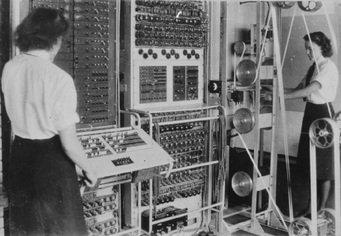 Colossus
Colossus 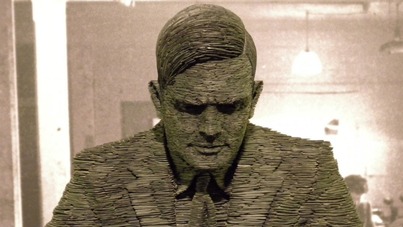 Stephen Kettle's statue of Turing at Bletchley Park.
Stephen Kettle's statue of Turing at Bletchley Park. After the war was over he began work on his own design for a digital computer, using his theoretical knowledge and his experience with Flowers' Colossus as a base. At the same time, in 1947 he began writing a stored computer program for Chess. He considered Chess to be an ideal game with which to test a computer's artificial intelligence, with the knowledge that to beat an expert human opponent a computer must demonstrate the ability to reason, anticipate and react to the vast number of possible moves in the game. However, despite finishing his algorithm Turing was unable to test the program, finding that no machine of the day could successfully run it efficiently. Instead he chose to test it in 1952 by acting as a computer as he read from his algorithm and calculated each move against a colleague. Each turn took half an hour to calculate, and even by the end Turning discovered that his program won one match but lost another.
Clearly, at the time Turing had a long way to go, but scientists stand by his use of Chess to test a Computer's ability to think rationally. Even today, developers are keen to create Chess programs that can beat Grand Masters and prove their superior analytical skills. Back in the 1950's, while chess still seemed out of reach, others turned to more simplistic games to demonstrate their machine's computing power...
Testing Technical Wizardry
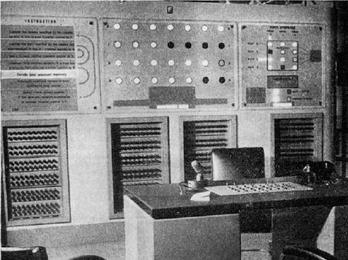 Ferranti's Nimrod
Ferranti's Nimrod The crowds were suitably wowed, however while Ferranti's intention was to demonstrate the computer's skill at maths with a game that used mathematical principals, they found that the many people who played against the machine were far less interested in the science than they were the game itself. The effect was similar a year later when the machine was taken to Berlin. Yet again the crowds were delighted at the computer that was "faster than thought" but only due to the fun game it played and the series of lights it displayed to represent the game's pieces. To some, this is considered the first ever gaming computer.
Despite this early indication that computers may one day become the entertainment machines they can be today, they were still seen as mathematical calculators and and games that were programmed into them were seen purely as research tools. Yet almost at the same time researchers where testing their machines in very similar ways.
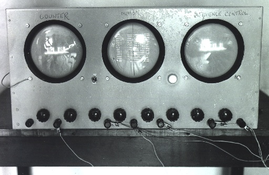 EDSAC's display monitor
EDSAC's display monitor The literally named Electronic Delay Storage Automatic Calculator, or EDSAC, was designed as the first ever computer to have Random Access Memory (more commonly known as RAM today). This also proved to be perhaps the first machine to play a game that could display visuals on a monitor, in the form of Tic-Tac-Toe. This however was never intended for public consumption.
More simply, it was used to test a thesis written by the young academic, Sandy Douglas, as he studied to achieve his PHD.
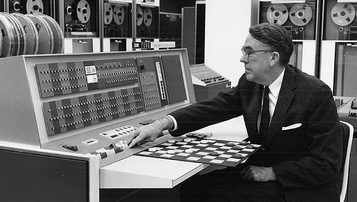 Samuels with an IBM 701 Computer
Samuels with an IBM 701 Computer First Steps...
The Long Road Ahead...

For now it's time we got back to the future!
Stay tuned for the 1960's as we uncover more of the early history of our favourite past-time!
If you're interested please let us know in the comments below!

 RSS Feed
RSS Feed
